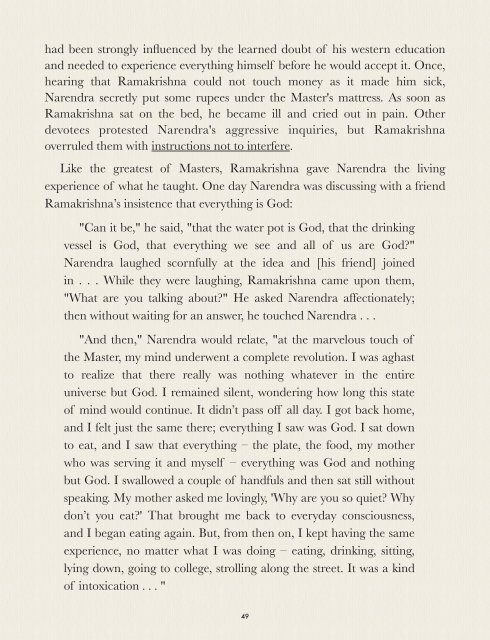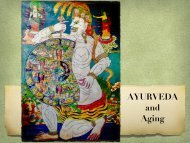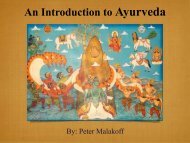How Thoreau's Walden Pond Mixed with the Ganges and Yoga Came to America with Swami Vivekananda
One early morning in 1846, during the coldest days of a New England winter, Henry David Thoreau looked out the window of his small cabin on Walden Pond and saw men cutting its ice into blocks. That ice was hauled by horse to a railroad that ran across the western edge of Walden Pond, packed into a boxcar, taken to Boston and loaded onto a clipper ship that sailed to Calcutta, India, arriving about four months later. Once there, that ice was purchased by grateful members of the East India Company. Thoreau had witnessed a small part of the global ice trade between New England and India that took place during the latter part of the nineteenth century. When Thoreau considered the ice trade, his vision sailed on metaphors far beyond the scope of business. The waters he imagined flowed both east and west and carried not just natural elements, but culture, religion and philosophy as well. He envisioned that after arriving in Calcutta, the New England ice of Walden Pond would eventually melt and run downhill where it would join with the sacred water of the Ganges. He wrote in Walden: "It appears that the sweltering inhabitants of Charleston and New Orleans, of Madras and Bombay and , drink at my well. In the morning I bathe my intellect in the stupendous and cosmogonal philosophy of the , since whose composition years of the gods have elapsed, and in comparison with which our modern world and its literature seem puny and trivial; and I doubt if that philosophy is not to be referred to a previous state of existence, so remote is its sublimity from our conceptions. I lay down the book [Bhagavad-Gita] and go to my well for water, and lo! there I meet the servant of the Bramin, priest of and and who still sits in his temple on the Ganges reading the , or dwells at the root of a tree with his crust and water jug. I meet his servant come to draw water for his master, and our buckets as it were grate together in the same well. The pure Walden water is mingled with the sacred water of the Ganges." This book tells the story of these waters . . .
One early morning in 1846, during the coldest days of a New England winter, Henry David Thoreau looked out the window of his small cabin on Walden Pond and saw men cutting its ice into blocks. That ice was hauled by horse to a railroad that ran across the western edge of Walden Pond, packed into a boxcar, taken to Boston and loaded onto a clipper ship that sailed to Calcutta, India, arriving about four months later. Once there, that ice was purchased by grateful members of the East India Company. Thoreau had witnessed a small part of the global ice trade between New England and India that took place during the latter part of the nineteenth century.
When Thoreau considered the ice trade, his vision sailed on metaphors far beyond the scope of business. The waters he imagined flowed both east and west and carried not just natural elements, but culture, religion and philosophy as well. He envisioned that after arriving in Calcutta, the New England ice of Walden Pond would eventually melt and run downhill where it would join with the sacred water of the Ganges. He wrote in Walden: "It appears that the sweltering inhabitants of Charleston and New Orleans, of Madras and Bombay and , drink at my well. In the morning I bathe my intellect in the stupendous and cosmogonal philosophy of the , since whose composition years of the gods have elapsed, and in comparison with which our modern world and its literature seem puny and trivial; and I doubt if that philosophy is not to be referred to a previous state of existence, so remote is its sublimity from our conceptions.
I lay down the book [Bhagavad-Gita] and go to my well for water, and lo! there I meet the servant of the Bramin, priest of and and who still sits in his temple on the Ganges reading the , or dwells at the root of a tree with his crust and water jug. I meet his servant come to draw water for his master, and our buckets as it were grate together in the same well. The pure Walden water is mingled with the sacred water of the Ganges."
This book tells the story of these waters . . .
You also want an ePaper? Increase the reach of your titles
YUMPU automatically turns print PDFs into web optimized ePapers that Google loves.
had been strongly influenced by <strong>the</strong> learned doubt of his western education<br />
<strong>and</strong> needed <strong>to</strong> experience everything himself before he would accept it. Once,<br />
hearing that Ramakrishna could not <strong>to</strong>uch money as it made him sick,<br />
Narendra secretly put some rupees under <strong>the</strong> Master's mattress. As soon as<br />
Ramakrishna sat on <strong>the</strong> bed, he became ill <strong>and</strong> cried out in pain. O<strong>the</strong>r<br />
devotees protested Narendra's aggressive inquiries, but Ramakrishna<br />
overruled <strong>the</strong>m <strong>with</strong> instructions not <strong>to</strong> interfere.<br />
Like <strong>the</strong> greatest of Masters, Ramakrishna gave Narendra <strong>the</strong> living<br />
experience of what he taught. One day Narendra was discussing <strong>with</strong> a friend<br />
Ramakrishna’s insistence that everything is God:<br />
"Can it be," he said, "that <strong>the</strong> water pot is God, that <strong>the</strong> drinking<br />
vessel is God, that everything we see <strong>and</strong> all of us are God?"<br />
Narendra laughed scornfully at <strong>the</strong> idea <strong>and</strong> [his friend] joined<br />
in . . . While <strong>the</strong>y were laughing, Ramakrishna came upon <strong>the</strong>m,<br />
"What are you talking about?" He asked Narendra affectionately;<br />
<strong>the</strong>n <strong>with</strong>out waiting for an answer, he <strong>to</strong>uched Narendra . . .<br />
"And <strong>the</strong>n," Narendra would relate, "at <strong>the</strong> marvelous <strong>to</strong>uch of<br />
<strong>the</strong> Master, my mind underwent a complete revolution. I was aghast<br />
<strong>to</strong> realize that <strong>the</strong>re really was nothing whatever in <strong>the</strong> entire<br />
universe but God. I remained silent, wondering how long this state<br />
of mind would continue. It didn’t pass off all day. I got back home,<br />
<strong>and</strong> I felt just <strong>the</strong> same <strong>the</strong>re; everything I saw was God. I sat down<br />
<strong>to</strong> eat, <strong>and</strong> I saw that everything – <strong>the</strong> plate, <strong>the</strong> food, my mo<strong>the</strong>r<br />
who was serving it <strong>and</strong> myself – everything was God <strong>and</strong> nothing<br />
but God. I swallowed a couple of h<strong>and</strong>fuls <strong>and</strong> <strong>the</strong>n sat still <strong>with</strong>out<br />
speaking. My mo<strong>the</strong>r asked me lovingly, 'Why are you so quiet? Why<br />
don’t you eat?' That brought me back <strong>to</strong> everyday consciousness,<br />
<strong>and</strong> I began eating again. But, from <strong>the</strong>n on, I kept having <strong>the</strong> same<br />
experience, no matter what I was doing – eating, drinking, sitting,<br />
lying down, going <strong>to</strong> college, strolling along <strong>the</strong> street. It was a kind<br />
of in<strong>to</strong>xication . . . "<br />
49


















